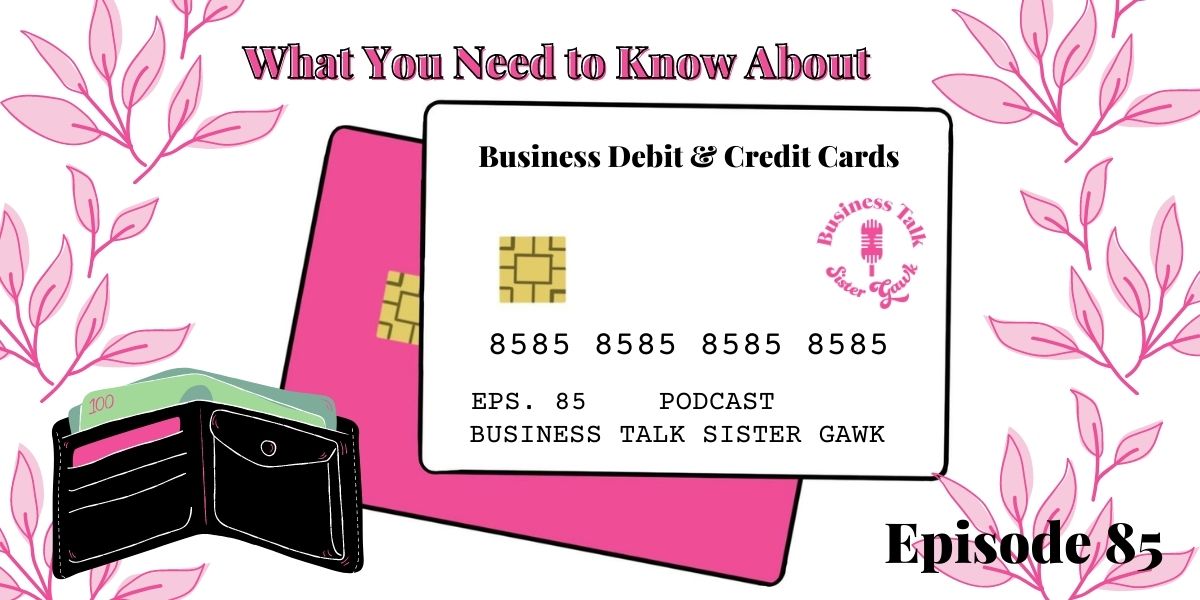This week, we talk with an experienced business expert, Julie George all about the pros and cons of credit and debit cards. She shares with us the different reasons why you would want to choose one versus another and things to watch out for as you make purchases for your business.
Welcome to Business Talk Sister Gawk! I’m Bekkah! And I’m Ruthie! And today’s episode title is “What You Need to Know About Business Debit & Credit Cards” and with us today we have an expert I would say on, because she’s been a business consultant for a super long time, has started her own nonprofit, has worked with so many different small/medium-sized/large businesses, Julie George! And she’s gonna be talking with us today! Thanks so much for being here!
Julie: Thank you for having me, ladies!
Ruthie: Yeah, and just some context. I know some people their favorite episode is the chicken nugget bracelet episode where we – I can’t even remember what episode number it is but at the end we talked about when I had this brilliant idea to make a chicken nugget bracelet and Julie George was the one who really tried to put wheels on that and get me going.
Bekkah: She was like, “It’s really a good idea!”
Ruthie: Yeah, I mean she was like trying to get me all hyped up on writing a business plan for it and I was like, “Yeah, yeah,” and then it just didn’t end up panning out because she was like, “FDA regulations.” And I was like, “That’s really hard.” *All laugh* Anyways but –
Julie: Sometimes I have to be a –
Ruthie: Thank you so much –
Julie: Thank you, thank you! Yeah, sometimes I have to be an idea squasher just so that we can put our time and effort into something that may be a little bit more lucrative.
Ruthie: Yeah, that’s fair.
Bekkah: You know, you can only love so many things until they don’t make any money, right?
Julie: Right, right, right!
What Do You Do in The World of Business?
Ruthie: Yeah, so we’ll just jump into kind of our first question with you which is what do you do?
Julie: So, currently, right now, I am an account executive for a financial tech company called “Bento for Business” and we help small businesses with their spend management platform and being able to create your own debit cards at will and also be able to control how when and where your company funds are being spent. So I get to work very closely with a lot of small businesses with their cash flow management.
Bekkah: Yeah, and I am super excited about this because Ruthie and I, we talk a lot about the difference between debit versus credit and all that kind of stuff and so I would love to hear your perspective on this for those things. What are the pros and cons of debit and credit cards?
What Are The Pros and Cons of Debit and Credit Cards?
Julie: Well, first I want to kind of just give a brief overview just so that all of our listeners are aware of the differences between debit and credit. Because sometimes you know that can vary. So although credit and debit cards typically look almost identical a lot of things do differ with credit and debit. Both really make it convenient to make purchases in stores, online, but the big difference is that debit is really going to be a budget setter for you.
You’re not going to be able to overspend and so that kind of brings me right into our pros and cons. The big pro of a debit card is that it can help with budgeting. Again we’re going to fund our account versus using a short-term loan like credit is. Debit cards are also going to be really convenient and widely accepted because it is a cash-based method. Another yeah – so that’s a big thing because some businesses, as we can tell, especially for those small, small businesses merchant fees can be a huge issue.
Debit eliminates a lot of that and cuts down the fees for the merchant. A lot of small businesses would prefer to not take credit cards. In that instance, another pro for debit cards is that you’re not going to have any annual fees. A lot of business credit cards do charge annual fees to participate in their rewards programs, different loyalty things, and some of their services and debit cards typically are not going to have annual fees attached to them.
I would say probably the last and most important is that debit is interest-free. So that can be a huge deal-breaker when we are on a very, very tight budget as a small business grows. Some of those interest in those un – I would say the unstructured expenses those, kind of oopsies, those can really hurt your cash flow management and put you behind month after month. Just something to think about that with the pros of debit cards.
How Do You Decide What Card Is Going to Be Best in Business?
Bekkah: Yeah, so when you’re a small business and you’re trying to scale which one do you think would be best to be using and how do you decide what’s going to be the right fit for a small business?
Julie: That is a – that’s a great, great question and so I’m going to just from my experience both as a business owner and advisor/consultant, you know, I recommend businesses use a combination of both credit and debit cards. The reason being is that, again, we want, as small business owners, to be able to have a variety of tools in our toolbox.
Whether that’s financial, in human resources, things like that. It can’t hurt to have both, but we have to know when is the right time to use those. So credit cards are great for large purchases and you know maybe even reoccurring payments that you know that you already have to pay and that you’ve allocated a budget for.
That can be nice because you can set that on recurring, gather some points, some rewards, and help with some short-term loans because we do know that things pop up as a business owner and we do need access to a quick credit line. That can be a great solution for business owners to get a business credit card.
While, on the other hand, you know debit cards are great to manage the unstructured spending that happens within your business because again when we start to have employees we start growing a little bit and scaling we have to give access to funds to our employees.
Being able to really nail down how much they can spend, where they can spend it, debit cards are a better option for that because again we can fund account, fund those debit cards, and then the money’s taken off. Versus at the end of the month going, “How much did we spend?” And so that’s where I agree the combination of both of those is good to have in your back pocket.
Ruthie: Okay, so then when you’re a small business and you’re wanting to kind of make this blend of a couple different cards and stuff what would be a good credit card? What attributes are good to have in a credit card?
What Attributes Are Good to Have in a Credit Card?
Julie: Yeah, so a couple of good things that you want to start to ask yourself when looking for a credit card is, “Are you getting a business credit card to build the business credit?” I mean that’s a big thing. So we want to look at what credit cards are best for that. Again, if we don’t have any business credit and we’re a new business, we have to start with certain credit cards that maybe work with us to build that business credit score. We have to look at that factor.
Another factor you want to look at is: Do you travel a lot? Certain cards are better for certain travel expenses, different airlines, you can get different rewards with different credit cards, and so we really want to maximize if we are paying interest and fees where our money is going you know as far as those loyalty and rewards points and again if we’re traveling we know that we’re using, for example, Delta all the time.
Delta uses the American Express card, so we’re gonna want to have that so we can get all those extra free baggage claims. Another thing you’re going to want to look for is: Are you getting cashback rewards? If that’s something important to you, there are a lot of different programs. Again some of those with larger cashback rewards are going to charge you annual fees.
We have to make sure that we are putting that into our budget as well. And then, again, when you’re starting off and looking for a business credit card there are a lot of credit cards out there that are gonna provide zero percent interest for an introductory period. So we’re going to want to maximize that short-term loan and get interest-free for as long as possible especially if we’re going to make a large purchase. Those are kind of the four questions I think about when I’m looking at a business credit card and then answering those and finding a credit card that fits those answers.
Ruthie: Yeah, that’s really good and I think like – I think that’s really helpful for people to think about even like you had said specifically with the traveling I was like, “Oh, yeah that’s good!”
Julie: Yep, yep, it’s those little things for small businesses that, again, if we can maximize it’s a huge, huge benefit in the long term just really setting that up and that’s again where I come back to a good business plan and thinking this all through!
You can’t think through enough of these details and you’re like, “Oh, I wouldn’t have thought that I had to think through my credit card and who my credit card’s for because that could end up really saving me a lot of money!” And so that’s why it’s nice to have a lot of people looking at those plans and why it’s nice to talk and have a podcast like this to just get a different perspective.
Do Credit Cards Get More Complicated With Employees?
Ruthie: Yeah, when you kind of have more employees and stuff how does that start getting complicated when you have like this business credit card or debit cards or things like that?
Julie: Yeah, so I think the biggest thing when we’re growing is employee trust. Again, credit you’re giving your employee a lot of trust that they’re gonna make purchases per your reimbursement plan, your policy, that they’re not using that credit card for their own benefit and so again that’s a tough, tough switch for a business owner to finally start ordering cards for their employees because again they’re all on their business credit score and so an employee can really overspend.
Because, again, we’re not working on a budget. We’re working on a credit limit that could far exceed what the cash flow for that business was for the month. Again, it can really be a hassle managing that employee spending in real-time and having visibility into their purchases with those credit cards and that’s why debit sometimes can be a preferred method for when we’re letting our employees spend.
It’s great to have a business – an owner credit card because again the owner has complete authority, knows what they want to spend on, what they don’t. And so debit can be a great option for that because it really streamlines and you know exactly where the money is being spent, how much, and we’re not finding out at the end of the month when we get the credit card statement.
Is It Common For People Use Credit Cards As Debit Cards in Business?
Bekkah: Yeah, so one of the things I had a question about which is a little off topic but do some people use a business credit card like they would a debit card where they just like say, “Well, this is how much we’re only gonna spend on this, but we’ll pay it off every single month so we don’t have to worry about those fees and stuff?”
Julie: Yes, you know I think that’s everyone’s hope is that that happens, but again when we’re you know when you can swipe that credit card and our limits ten thousand dollars and we only want to spend five this month it’s really easy to just go “ding, ding, ding” and kind of forget in real-time. Because, “Oh, yeah, I had this running tally in my head,” or “Oh, you know, I forgot to give my manager that receipt and so we think that we have more money to spend than we really do!”
That’s where a lot of people get into trouble, a lot of businesses get into trouble is that it’s these, “Oh, well, I thought.” “Oh, I didn’t know!” It’s, “Oh, well, next time I’ll do that,” and then it’s on the responsibility of the accountant, bookkeeper, owner to just make sure that their expense policy is being actually followed. That can again lead to a lot of trust issues and when we don’t have employee trust a lot of things start to go downhill in the business when an employee feels or a business owner feels that there is a little bit of this mismanagement, mistrust there.
What Debit and Credit Card Resources Do You Recommend for Spending Accountability?
Bekkah: Yeah, so what recommendations do you have on creating accountability for what a business spends?
Ruthie: Specifically, when you were mentioning like that trust piece and stuff because I feel like accountability is such a huge piece of that.
Julie: Yeah, so you know in today’s world technology. How do we use technology to work smarter not harder? That’s always been my motto and that’s really why I got into this new role that I’m in because you’re able now through some technology platforms to put expense policies directly on your card.
So a human does not have to manage it. The employee does not have to manage it. The computer can and the computer can say “yes” and “no. It doesn’t have to be your boss. It doesn’t have to be like, “Oh, well, this time I’ll be nice,” And you have that human element of guilt that comes in. The computer says, “You can spend this. You can spend it on this, this, and this.”
You can now have merchant codes and categories so you can make specific fuel cards, gas cards, utility cards, things of that nature. It, again, let’s have technology work for us and be the bearer of bad news to the employee that, “Hey, we’re over budget! Nope, there are no more funds left!”
So pre-paying and the debit model really helps with that. Because again we can fund that account automatically with five thousand dollars every month and we know where, when, and how our employees are going to spend that because we’ve limited that within the expense policy in the program.
Ruthie: Wow! That’s so neat like just the – I love that when you said – because I think that made it all click for me when you’re explaining it to us before like the merchant codes. Like people not being able to use a certain debit card on alcohol because the merchant code is different than gas. So if they have this employee card then they can only use it for gas and I thought that was really fancy!
Julie: Yeah!
Ruthie: Like! Woah! Look at that!
Julie: Well, and we can even tailor it down to, “Hey, we only want this card to be used that pay at the pumps versus going in so that they can’t buy items inside the store.” And again I think a big thing with businesses that we lose track of with any purchase is receipts! What do we do with these receipts? Well, we need these receipts.
You know credit card or debit or whatnot and so a lot of these expense platforms such as Bento will allow for some receipt management, finally! Again, let’s use some technology! We all have a smartphone in our back pocket. I don’t know very many people or businesses that don’t have access to some type of smartphone to be able to manage this stuff so we don’t have to have this paper trail anymore or go, “Oh, I don’t know what happened to that,” or “My dog ate it!” or “I washed it.”
Then again in the event that you get audited those are the times you need those receipts and you’re really wishing that the dog didn’t eat it! So that’s where I go, “How can we prepare for a worst-case scenario?” And it is using technology now that’s a lot of businesses – that’s how we’re getting smart and we’re being able to be more purposeful about how we manage our funds is through technology.
What to Watch For When Making Online Purchases for Business
Bekkah: Yeah, okay, so you had mentioned something before and I thought this was super interesting. It was kind of like around the why you have to be aware of what you buy online. This was kind of more focused on certain things like I think you were talking more about use tax or sale sales and use tax that some companies online weren’t charging it and trying to collect all of those specific ones for your business is a big deal! Could you explain that because I think that’s a really good tool for business owners to understand about both credit and debit cards when they’re making online purchases.
Julie: Yeah, absolutely and I think we forget how tax works. Since credit cards are a convenient manner to make online purchases, the purchases often do not reflect the appropriate sales or use tax and you’re gonna go, “Well, why?” and so you know basically what happens is if an online retailer does not have a physical presence in your state, that business may not be required to register and collect your sales tax for your state, but you still owe it.
So that’s where we get into this catch 22 with using credit cards for that because again we don’t know when we’re looking at and we’re being audited maybe a year later, “Oh, well, what was that purchase used for? Because all we have is a credit card statement.” And that’s where having a spend management platform of some sort in your toolbox will help eliminate that because again we’ll know exactly – we’ll be able to really take those purchases out, figure out where tax is due, and be able to see so that we know we’re not having to sift through years and years of credit card and receipt purchases.
Again, it’s just one of these things that can really derail a business very quickly when you have to put bandwidth into an audit. When you have to put funds into an audit, you have to pay large fines or fees associated with audits, you haven’t paid the correct sales tax and use. I can tell you that in my years as a consultant I handheld handfuls of businesses doing this exact same thing.
Having to find loans on how we’re gonna pay these sales, because again they’re not just gonna go back one year they’re gonna go way back and they’re gonna dig up every credit card purchase and these audits they will find every penny that you have not paid. Again, when you’re slapped with tens of thousands of dollars in sales tax that you haven’t paid over the years that can really, really, really hinder a business.
I can tell you specifically one business went out of business because of it. They just did not have the funds to be able to pay it. Unfortunately, the IRS is like, “We don’t care! You owe us this!” So that’s where again the visibility into purchases can be a big thing. And credit cards we just think, “Oh, Amazon and this!”
Well, Amazon – again we’re not paying a lot of sales and use taxes with Amazon purchases so if you’re using your business Amazon account for your home stuff, you could start paying a lot of tax on purchases that were intended for personal versus business and the other way around. The debit model is nice for that because we have a lot more visibility into these purchases with the spend management platform.
Bekkah: Okay, so thank you so much for sharing that with us too because for me that was just a little bit of a nerdy thing like, “Oh! Sales and use tax! I know about this!” And that’s crazy and I know that you got at Bento there’s a lot of stuff there that is an all-in-one solution for that and so when you originally gave us – when we were talking just about your new job and everything I was like, “Oh, this is such a cool thing!” So why don’t you tell us a little bit about where people can find you and then also too I hear that you have some really cool freebie for us or something so I want to hear about that too.
Julie: Yes, yes, yes! So you know again thanks for having me again you can find me on LinkedIn I can also be reached on email [email protected]. Always willing to take a business question or two. Even if it doesn’t relate to financial so love being a business advisor and because also I work for Bento and Bento is passionate about helping businesses grow we wanted to extend our free trial for our platform and give an additional two months free to the listeners of Business Talk Sister Gawk!
If you use the promo code “sister gawk” we’ll give you an additional – we’ll give you four months for free on our platform to try it out to make sure that it’s a tool that works for you! Again, we’re here to help businesses grow and I’m Julie George!
Ruthie: Wow! We have our own promo code! That’s so exciting!
Bekah: Yeah, I was literally like when we were talking about , “Oh, you could literally just like do enough money for one purchase on one debit card!” And that’s it so then like there’s no like reoccurring oh and you subscribe to this and you have no idea or whatever I was like, “I just had that happen this week!” and I was like, “I never, I never subscribed to a long-term thing. Like I don’t know why you’re charging me all this money!”
Julie: Yup!
Bekkah: And it was just like, “Wow! That’s so true! It eliminates so many headaches when you can just create cards and take them off whenever you want.”
Julie: Oh, I know! Absolutely, it’s like you know again that’s why I like Bento because for a business owner to be able to try with no contract, no hidden fees, no nothing to be able to try it out to see that it works because if it does great! And if it doesn’t let’s find you something that does!
Bekkah: Yeah!
Ruthie: And we have a cool friend that works for them!
Bekkah/Ruthie: Yeahh!!




